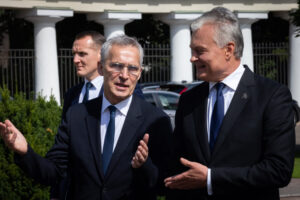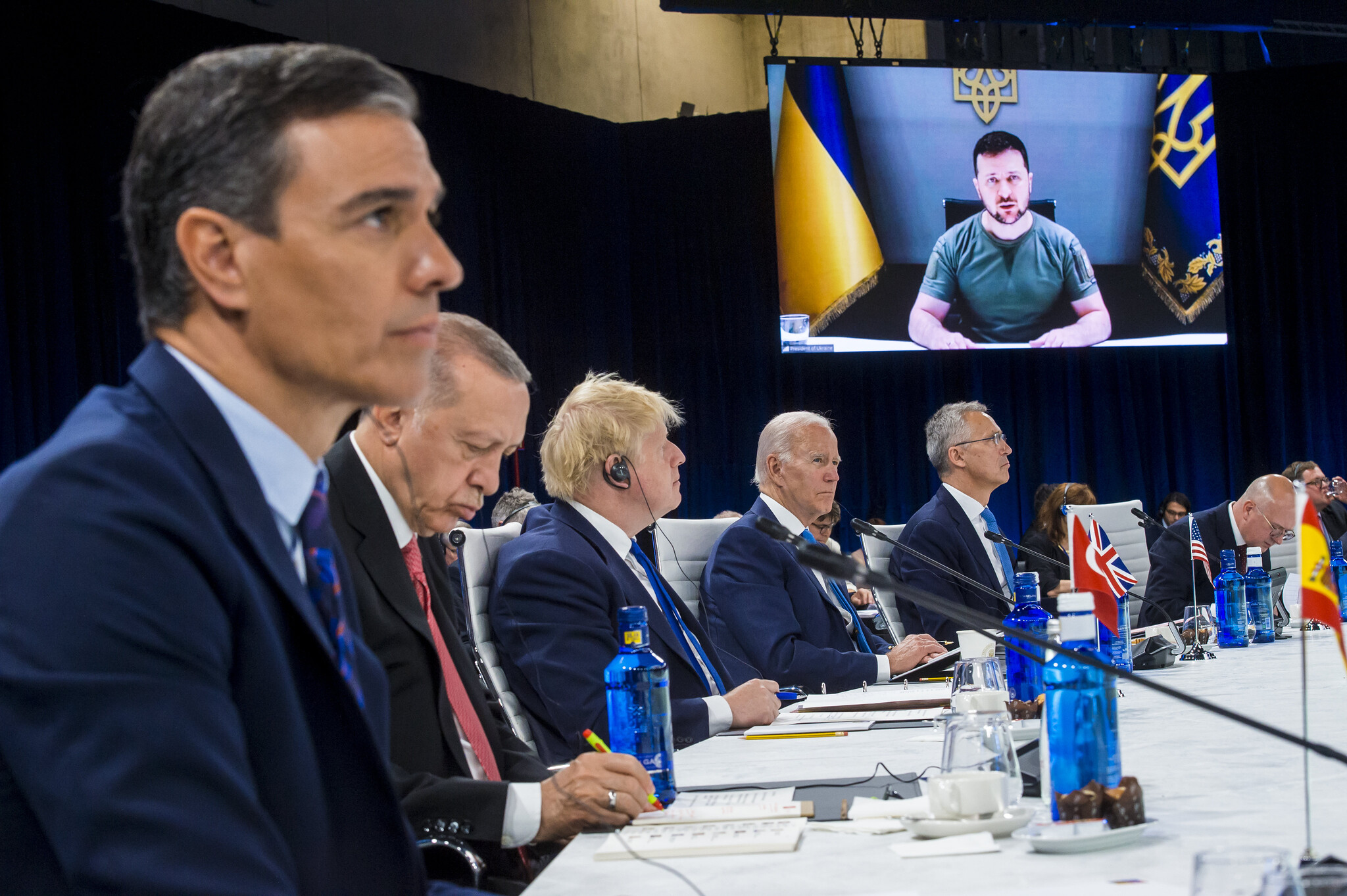NATO Summit, a Theater of the Absurd
WAR RACKET--CATASTROPHE CAPITALISM, 17 Jul 2023
Scott Ritter | Consortium News - TRANSCEND Media Service
The unfulfilled goals and objectives from last year’s meeting in Madrid loom over the Atlantic military alliance. When the membership meets in Vilnius this week, normalizing failure might best describe the most that can be accomplished.

NATO Secretary General Jens Stoltenberg and Lithuanian President Gitanas Nauseda, on June 26. (NATO)
10 Jul 2023 – The leaders of NATO’s 31 constituent member states have begun to assemble in Vilnius, the capital of Lithuania, for the alliance’s 33rd summit, an event that has come to symbolize the military organization’s increasingly difficult task of transforming political will into tangible reality.
Since the Wales Summit of 2014, when NATO made Russia a top priority in the aftermath of the Russian annexation of Crimea, and the Warsaw Summit of 2016, when NATO agreed to deploy “battlegroups” on the soil of four NATO members (Latvia, Estonia, Lithuania and Poland) in response to perceived Russian “aggression” in the region, Russia has dominated the NATO agenda and, by extension, its identity.
The Vilnius summit promises to be no different in this regard.
One of the major issues confronting the NATO leadership is that the Vilnius summit operates under the shadow of last year’s Madrid summit, convened in late June in the aftermath of Russia’s initiation of military operations against Ukraine.
The Madrid summit came on the heels of Boris Johnson’s deliberate sabotage of a Ukrainian-Russian peace agreement that was supposed to be signed on April 1, 2023, in Istanbul, and the decision by the United States in May 2023 to extend to Ukraine military assistance exceeding $45 billion as part of a new “lend lease” agreement.
Related: The Failed Ukrainian Peace Deal
In short, NATO had opted out of a peaceful resolution to the Russia-Ukraine conflict and instead chose to wage war by proxy — with Ukrainian manpower being married with NATO equipment — designed to achieve what U.S. Ambassador to NATO Julianne Smith, in May 2022, called the “strategic defeat” of Russia in Ukraine.
The Madrid summit generated an official NATO statement which declared that “Russia must immediately stop this war and withdraw from Ukraine,” adding that “Belarus must end its complicity in this war.”
When it came to Ukraine, the Madrid statement was equally firm. “We stand in full solidarity with the government and the people of Ukraine in the heroic defense of their country,” it read.
“We reiterate our unwavering support for Ukraine’s independence, sovereignty, and territorial integrity within its internationally recognized borders extending to its territorial waters. We fully support Ukraine’s inherent right to self-defense and to choose its own security arrangements. We welcome efforts of all Allies engaged in providing support to Ukraine. We will assist them adequately, recognizing their specific situation.”
Confidently Seeking a ‘Strategic Defeat’

Ukraine’s President Volodymyr Zelensky joins NATO meeting in Madrid in June 2022 via video link. From left at table: Spain’s Prime Minister Pedro Sánchez, Turkey’s President Recep Tayyip Erdogan; Boris Johnson, then U.K. prime minister, U.S. President Joe Biden and NATO Secretary General Jens Stoltenberg. (President of Ukraine)
NATO, it seemed, was supremely confident in its ability to achieve the outcome it so very much wanted — the strategic defeat of Russia.
What a difference a year makes.
NATO assistance to Ukraine resulted in a successful counteroffensive which compelled Russia to withdraw from territory around the city of Kharkov, as well as abandon portions of the Kherson Oblast located on the right bank of the Dnieper River. Once the Russian defenses solidified and the Ukrainian attack stalled, NATO and Russia both began preparing for the next phase of the conflict.
NATO began a months-long effort to equip and train nine Ukrainian army brigades to NATO standards by providing them with NATO tanks, armored vehicles, artillery and training them in NATO-style combined arms warfare.
For its part, Russia conducted a partial mobilization of both its manpower (calling up some 300,000 reservists while recruiting an additional 150-200,000 volunteers) and its defense industry (dramatically increasing its production of tanks, missiles and artillery ammunition). Moreover, Russia prepared hardened defensive positions in accordance with a military doctrine that had been updated to consider the lessons of the first year of the Special Military Operation in Ukraine.
NATO had placed high hopes on the Ukrainian army being able to carry out a counteroffensive against Russia which would achieve discernable results both in terms of territory re-captured and casualties inflicted on the Russian army. The results, however, have been dismal to date — tens of thousands of Ukrainian casualties and thousands of destroyed vehicles while failing to breach even the first line of the Russian defenses.
One of the challenges NATO will face in Vilnius is the question of how to recover from this setback. Many NATO countries are starting to exhibit “Ukraine fatigue” as they see their armories stripped bare and their coffers emptied in what, by every measurement, appears to be a losing cause.
The scope and scale of the Ukrainian military defeat is such that the focus of many NATO members appears to be shifting from the unrealistic goal of strategically defeating Russia to a more realistic objective of bringing about a cessation to the conflict that preserves Ukraine as a viable nation state.
Ukrainian President Volodymyr Zelensky will attend the NATO summit. However, his demands for NATO membership will not be met — U.S. President Joe Biden himself has weighed in on the matter, saying this would not be possible while Ukraine is at war with Russia.
Face-Saving Gestures
There will be face-saving gestures from NATO, such as the creation of a NATO-Ukraine Council and talk of eventual post-conflict security guarantees. But the reality is Zelensky’s presence will do Ukraine more harm than good, since it will only accentuate the internal disagreement within NATO on the issue of Ukrainian membership and highlight NATO’s impotence when it comes to doing anything that can meaningfully alter the current trajectory on the battlefield, which is heading toward a strategic defeat for both Ukraine and NATO.
The vision of the Madrid summit was that of NATO capitalizing on its strategic victory against Russia to further expand its ranks in Europe (both Finland and Sweden were invited), and to push its influence into the Pacific Ocean. While NATO’s Pacific partners (Australia, New Zealand, Japan and South Korea) have been invited to Vilnius, the hopes that their presence would coincide with the announcement of the opening of a NATO liaison office in Japan have been quashed by France, which objects to an alliance ostensibly focused on North Atlantic security becoming involved in the Pacific.
While Finland has joined NATO, Sweden has not, and its membership is becoming increasingly problematic given Turkey’s opposition. Turkish President Recep Erdogan’s recent announcement that Turkey will agree to Swedish NATO membership when the European Union admits Turkey appears to be a poison pill that permanently scutters Sweden’s membership hopes, since the European Union is not inclined to admit Turkey.
The Vilnius summit will most likely be defined by these issues, and by the inability of the alliance to reach a meaningful consensus on how best to address them.
One can expect a plethora of rhetorical spin and posturing by the NATO membership, but the fact is the real mission of the Vilnius summit is how best to achieve a soft landing from the unfulfilled goals and objectives laid out last year in Madrid.
Normalizing failure might best describe the best that NATO can accomplish in Vilnius.
Any failure to try to stop the accumulation of debacles that represent the current NATO policy toward Ukraine will result in further collapse of the military situation in Ukraine, and the political situation in Europe, which, in their totality, push NATO closer to the moment of its ultimate demise.
This prospect does not bode well for those whose task it is to put as positive a spin as possible on reality. But NATO has long ago stopped dealing with a fact-based world, allowing itself to devolve into a theater of the absurd where actors fool themselves into believing the tale they are spinning, while the audience stares in dismay.
________________________________________
 Scott Ritter was a US Marine Corps intelligence officer for 12 years. As a chief weapons inspector for the UN Special Commission in Iraq, he was labeled a hero by some, a maverick by others and a spy by the Iraqi government. In charge of searching out weapons of mass destruction within Iraq, Ritter was on the front lines of the ongoing battle against arms proliferation. He has had an extensive and distinguished career in government service with assignments in the former Soviet Union and the Middle East. In 1991, Ritter joined the United Nations weapons inspections team, or UNSCOM. He participated in 34 inspection missions, 14 of them as chief inspector. Ritter resigned from UNSCOM in August 1998, citing U.S. interference in the inspections. He is the author of many books, including Scorpion King: America’s Suicidal Embrace of Nuclear Weapons from FDR to Trump; Iraq Confidential: The Untold Story of the Intelligence Conspiracy to Undermine the UN and Overthrow Saddam Hussein; Target Iran: The Truth about the White House’s Plans for Regime Change; and Waging Peace: The Art of War for the Antiwar Movement. Contributor author: Deal of the Century: How Iran Blocked the West’s Road to War, Clarity Press. He is a graduate of Franklin and Marshall College, with a B.A. in Soviet history.
Scott Ritter was a US Marine Corps intelligence officer for 12 years. As a chief weapons inspector for the UN Special Commission in Iraq, he was labeled a hero by some, a maverick by others and a spy by the Iraqi government. In charge of searching out weapons of mass destruction within Iraq, Ritter was on the front lines of the ongoing battle against arms proliferation. He has had an extensive and distinguished career in government service with assignments in the former Soviet Union and the Middle East. In 1991, Ritter joined the United Nations weapons inspections team, or UNSCOM. He participated in 34 inspection missions, 14 of them as chief inspector. Ritter resigned from UNSCOM in August 1998, citing U.S. interference in the inspections. He is the author of many books, including Scorpion King: America’s Suicidal Embrace of Nuclear Weapons from FDR to Trump; Iraq Confidential: The Untold Story of the Intelligence Conspiracy to Undermine the UN and Overthrow Saddam Hussein; Target Iran: The Truth about the White House’s Plans for Regime Change; and Waging Peace: The Art of War for the Antiwar Movement. Contributor author: Deal of the Century: How Iran Blocked the West’s Road to War, Clarity Press. He is a graduate of Franklin and Marshall College, with a B.A. in Soviet history.
Go to Original – consortiumnews.com
Tags: Military, NATO
DISCLAIMER: The statements, views and opinions expressed in pieces republished here are solely those of the authors and do not necessarily represent those of TMS. In accordance with title 17 U.S.C. section 107, this material is distributed without profit to those who have expressed a prior interest in receiving the included information for research and educational purposes. TMS has no affiliation whatsoever with the originator of this article nor is TMS endorsed or sponsored by the originator. “GO TO ORIGINAL” links are provided as a convenience to our readers and allow for verification of authenticity. However, as originating pages are often updated by their originating host sites, the versions posted may not match the versions our readers view when clicking the “GO TO ORIGINAL” links. This site contains copyrighted material the use of which has not always been specifically authorized by the copyright owner. We are making such material available in our efforts to advance understanding of environmental, political, human rights, economic, democracy, scientific, and social justice issues, etc. We believe this constitutes a ‘fair use’ of any such copyrighted material as provided for in section 107 of the US Copyright Law. In accordance with Title 17 U.S.C. Section 107, the material on this site is distributed without profit to those who have expressed a prior interest in receiving the included information for research and educational purposes. For more information go to: http://www.law.cornell.edu/uscode/17/107.shtml. If you wish to use copyrighted material from this site for purposes of your own that go beyond ‘fair use’, you must obtain permission from the copyright owner.
Read more
Click here to go to the current weekly digest or pick another article:
WAR RACKET--CATASTROPHE CAPITALISM: